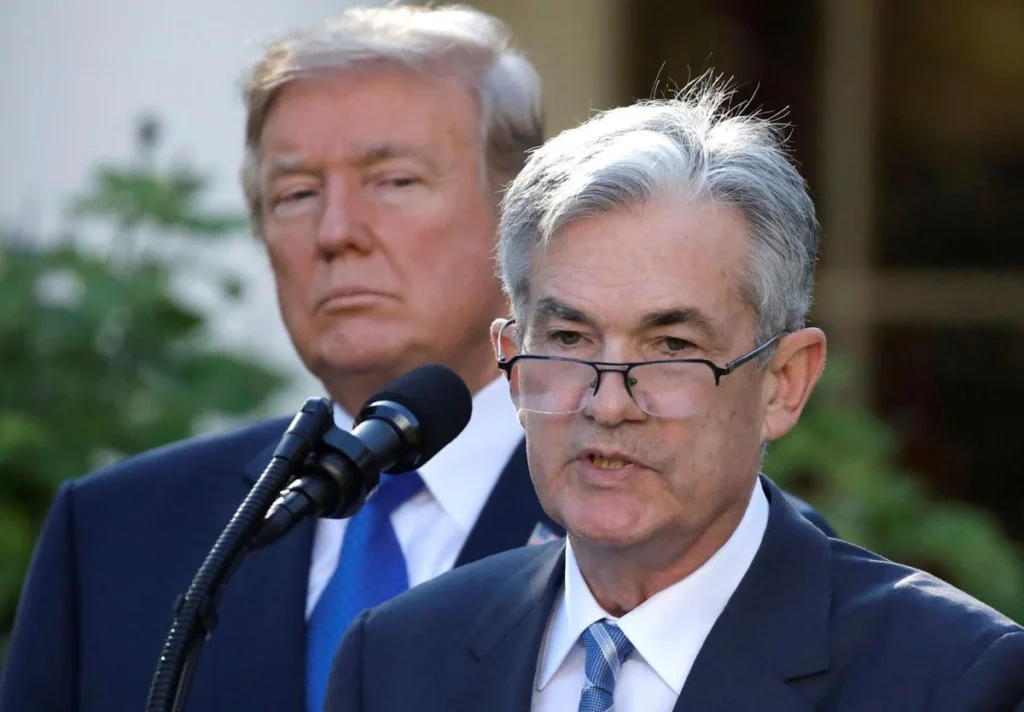President Donald Trump sharply criticized Federal Reserve Chair Jerome Powell on Thursday, accusing him of playing politics with interest rates and openly suggesting that he could be removed from his position—remarks that have reignited debates over the independence of the central bank and the potential for a legal battle with sweeping economic implications.

Speaking during a press conference in the Oval Office alongside Italian Prime Minister Giorgia Meloni, Trump expressed deep dissatisfaction with Powell’s handling of monetary policy, saying, “If I want him out, he’ll be out of there real fast, believe me. I’m not happy with him.” The comment followed an earlier post on Trump’s social media platform in which he demanded an interest rate cut and declared that “Powell’s termination cannot come fast enough!” Though Powell’s current term as Fed chair does not expire until May 2026, Trump’s renewed hostility raises questions about the legal boundaries of presidential authority over the Federal Reserve.
Powell, originally appointed by Trump in 2017 and later reappointed to a second term by President Joe Biden in 2022, has repeatedly emphasized the legal protections that insulate the Fed from political interference. Just a day prior to Trump’s comments, Powell reaffirmed that the Federal Reserve’s independence is mandated by law. “We’re not removable except for cause. We serve very long terms—seemingly endless terms,” he remarked during a speech in Chicago. He also reiterated that the central bank’s policy decisions are guided solely by the goal of supporting the broader American economy, stating, “That’s the only thing we’re ever going to do. We’re never going to be influenced by any political pressure.”
Trump’s latest attacks are rooted in his belief that interest rates should be falling, not holding steady or rising. He has insisted that inflation is no longer a pressing issue, describing the current environment as one where “we have essentially no inflation.” Yet official data tells a different story. Inflation, which spiked to 9.1% in 2022, has since eased significantly, falling to 2.4%—just above the Fed’s long-standing 2% target. Nevertheless, Powell and other Fed officials have indicated that they are maintaining the current rate levels in response to uncertainties surrounding the economic impact of Trump’s proposed tariffs and tax policies.
The president has called for sweeping tariffs, including a 10% blanket tax on all imports and a staggering 145% tariff on goods from China. Economists and central bankers alike have warned that such measures are likely to increase inflationary pressure by driving up costs for consumers and businesses. Powell has explicitly stated that the Fed is holding off on any further rate cuts until it gains more clarity on how these trade policies will affect the economy, cautioning that tariffs may further complicate the Fed’s task of controlling inflation.
The ongoing tension between Trump and Powell has once again underscored the importance of the Fed’s autonomy. Economists widely agree that an independent central bank is better positioned to make difficult but necessary policy decisions without succumbing to short-term political agendas. Historical examples—such as President Nixon’s influence on the Fed to keep rates low ahead of the 1972 election, which contributed to runaway inflation—serve as cautionary tales.
Despite Trump’s criticism, Wall Street markets appeared relatively unfazed by his comments, a possible indication that investors still believe in the institutional strength and independence of the Federal Reserve. Still, analysts are watching closely, particularly in light of a case pending before the Supreme Court that could alter the legal standards for how presidents may dismiss top officials from independent federal agencies. While it’s unclear whether the outcome of that case would directly affect the Federal Reserve, it could set a precedent with serious ramifications.
In a past interview with Bloomberg News, Trump had suggested that he would allow Powell to finish his term if reelected. However, his recent statements and social media rhetoric indicate a dramatic shift in tone. One of Trump’s top economic advisers, Kevin Hassett, recently said in a televised interview that “there’s not going to be any political coercion over the Fed, for sure.” But the president’s escalating criticism of Powell may cast doubt over that assurance.
Trump’s economic policies—particularly the proposed tariff hikes—have already had a measurable impact. Following the announcement of new import taxes on April 2, financial markets reacted swiftly, prompting Trump to declare a 90-day pause on implementation. Analysts at Goldman Sachs have since increased the probability of a recession, citing the inflationary effects of the tariffs and slowing economic growth. Consumer sentiment has also dipped, with more Americans expressing concern over job security and rising costs of goods and services.
An analysis by Yale University’s Budget Lab estimated that the inflationary burden of Trump’s proposed trade policies would effectively cost the average U.S. household nearly $4,900 annually. As economic conditions grow more uncertain, Powell’s role as a stabilizing force has come under increasing scrutiny from political leaders—especially Trump, who appears eager to shift the narrative ahead of the 2024 election.
The standoff between Trump and Powell is not just a political dispute; it represents a broader ideological clash over how monetary policy should be conducted in a volatile global economy. As the Federal Reserve prepares for future decisions, its commitment to independence will likely be tested again and again, especially if the rhetoric from Trump’s camp continues to intensify.



